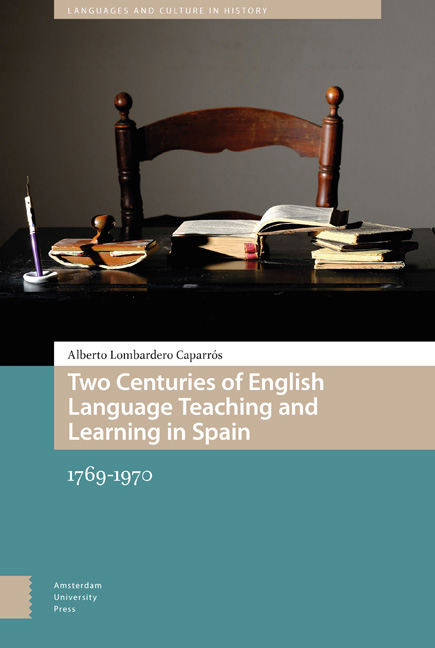1 - The Inception of ELT in Spain (1769-1850)
Published online by Cambridge University Press: 21 November 2020
Summary
Abstract
The first decades of the teaching and learning of the English language in Spain come under close scrutiny in this chapter, against a backdrop of socio-cultural and political turmoil. The first acts of official legislation on education are also dealt with to trace the (non-)inclusion of English as an independent subject in official curricula. At the same time, a more global and contrastive vision of foreign language teaching in Europe in terms of major innovations in the field is also accounted for. Regarding the Spanish tradition, the core topics dealt with are the official and private institutions where English was taught as well as how it was taught, laying special stress on some of the most published manuals in the period covered in this chapter.
Keywords: ELT, Spain, official curricula, Thomas Connelly, Guillermo Casey
Political and socio-cultural framework
At the outset of our period, Spain was no longer the empire whose heyday had lasted over a century and a half, between the ‘discovery’ of America in 1492 and the end of the Thirty Years’ War in 1648. By the beginning of the eighteenth century, a civil war known as the War of the Spanish Succession, brought in a new royal dynasty. The Austro-German Habsburgs were taken over by the French Bourbons as stated in the Treaty of Utrecht (1713). Oliván and Sáez (2004: 140) depict the main guidelines of the Bourbon reforms, which reinforced the figure of the absolutist-driven king as being much like Louis XIV's so-called motto L’État, c’est moi:
La implantación del reformismo borbónico no sólo generó una serie de transformaciones en las instituciones políticas favorecedoras de la centralización y de la globalización de la administración. Los hombres nuevos que tomaron las riendas del poder, se impregnaron de los aires ilustrados perceptibles en el ambiente intelectual y cultural del XVIII español.
The deployment of the Bourbon reforms did not only generate a series of changes in political institutions favouring the centralization and globalization of the administration. The new men who took the reins of power were imbued with enlightenment ideas perceptible in the intellectual and cultural atmosphere of eighteenth-century Spain.
- Type
- Chapter
- Information
- Two Centuries of English Language Teaching and Learning in Spain1769–1970, pp. 25 - 66Publisher: Amsterdam University PressPrint publication year: 2019



